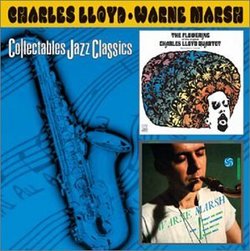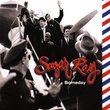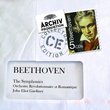| All Artists: Charles Lloyd, Warne Marsh Title: Flowering / Warne Marsh Members Wishing: 2 Total Copies: 0 Label: Collectables Release Date: 7/27/1999 Genres: Jazz, Pop Styles: Cool Jazz, Smooth Jazz, Bebop Number of Discs: 1 SwapaCD Credits: 1 UPC: 090431628522 |
Search - Charles Lloyd, Warne Marsh :: Flowering / Warne Marsh
 | Charles Lloyd, Warne Marsh Flowering / Warne Marsh Genres: Jazz, Pop
|
Larger Image |
CD DetailsSimilar CDs
|
CD ReviewsThe Warne Marsh half is my inner monologue J. B. Johnson | San Francisco, CA United States | 08/20/2003 (5 out of 5 stars) "I don't want to talk about the Charles Lloyd part of this - - it's okay, but I never listen to it because after that is Warne Marsh in top form. I'm giving it 5 stars just for the Warne Marsh tunes.The rhythm section is great, of course; Paul Chambers etc from the Miles Davis band - - they put down an intense, understated foundation for that unique, burbling tenor tone that I love so well. Marsh aspired to play "all music". I've heard his playing described as overly cerebral, but to me he never sounds like he's thinking of anything other than the music. I mean he's not thinking about scales or counting bars; he'is just pulling the most exquisitely formed melodies out of the air as he finds them, all their turns and twists intact... with a degree of presence and concentration that is both spiritual and passionate. I owned this on vinyl, then wore out a cassette tape of it, and now the MP3s on my computer are my most played by far. On a good day, I hear this album in my head as I go about my business." An Odd Pair G B | Connecticut | 03/18/2006 (5 out of 5 stars) "This is a weird pairing of two great albums.
The Flowering is one of the best of the late 60s Charles Lloyd albums on Atlantic -- inferior only to Dream Weaver, in my opinion. Lloyd's tenor playing, occasionally noodly or unfocused on some of this quartet's recordings, is quite powerful here. The rest of the quartet (Keith Jarrett, Cecil McBee, and Jack DeJohnette) is in fine form on these 1966 live recordings from Europe. The material leans quite heavily on progressive post-bop, with less of the accessible crossover material that appears on other recordings. The album opens with a brisk take on Kurt Weill's "Speak Low", including a great solo introduction by Lloyd. "Love-In" gets a more mellow, less peppy interpretation than on the album of that same name; after a gospelly solo by Keith Jarrett, it leads to the first of two versions of "Island Blues", this time with Lloyd on flute. "Wilpan's" is an up-tempo modal number composed by McBee, reminiscent of "Impressions" and "So What". "Gypsy '66" (aka Gabor Szabo's "Lady Gabor") gets an intense, lengthy workout with some intense Lloyd flute and one of Jarrett's best solos from this period. The album closes with yet another medley including "Island Blues", this time with a nice downhome solo by Lloyd on tenor. The Marsh set is also excellent. On two of the tracks, Marsh is backed by a quartet that includes Paul Chambers and Philly Joe Jones. On the rest, it's a piano-less trio with Chambers and Paul Motian. Chambers gives a standout performance, and Marsh offers some of that oblique, enigmatic tenor that seems to anticipate Wayne Shorter (at least to my ears). This release is highly recommended for fans of Lloyd and/or Marsh." |

 Track Listings (11) - Disc #1
Track Listings (11) - Disc #1

